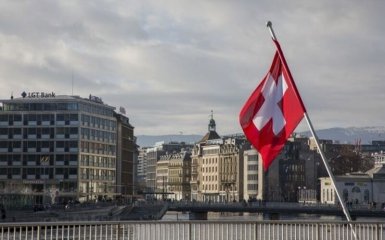The Swiss Federal Council joins the European Union in adopting the 12th package of sanctions in December 2023. The new measures will enter into force on February 1.
Switzerland joined the 12th package of anti-Russian sanctions
On January 31, Switzerland decided to join the 12th package of European Union sanctions against Russia.
The Swiss government press release reports this.
At its meeting on January 31, the Federal Council adopted additional sanctions against Russia. This is a response to Russia's ongoing military aggression against Ukraine. The Federal Council thereby joins the European Union, which adopted the 12th package of sanctions in December 2023, the statement said.
It is noted that the new measures will enter into force in February. On December 21, Switzerland added 147 individuals and legal entities to its sanctions lists.
Ban on Russian diamonds and additional control over trade in goods
Among the new measures is a phased purchasing and importing of Russian diamonds. Switzerland, therefore, joins the measures agreed at the G7 summit on December 6 2023, to deprive Rucriticalhis vital revenue stream.
The authorities responsible for implementing these measures in Switzerland will work with the relevant sector to ensure that the new restrictions are coordinated internationally and implemented effectively.
What else fell under the ban
Bans are introduced to import goods that bring significant income to the Russian state. For example, purchasing and importing pig iron and liquefied petroleum gas from Russia is prohibited. The lists of banned goods that can strengthen Russia's military-technical potential or goods that enhance the Russian industrial sector are also being expanded.
These new measures ban the export and sale of chemicals, lithium batteries, some drone engines, machine tools, and machine parts to Russia. In addition, more organizations have been added to the list of companies subject to restrictions on civilian and military goods (dual-use goods).
In the financial sector, Russian citizens and individuals residing in Russia will be prohibited from controlling companies in Switzerland that provide crypto-asset services. Additional measures are also to support compliance with the price cap on Russian crude oil and petroleum products and counter attempts to circumvent the cap.
Market participants must now share detailed prices with competent authorities upon request. New reporting and permit requirements will be introduced to monitor tanker sales that can be used to circumvent the oil price cap.
There is currently a ban on providing Russian companies with enterprise management software and industrial design and production software in the service sector. The Federal Council made exceptions for providing services to Russian subsidiaries of Swiss companies.
What Switzerland decided to give up
The twelfth package of EU sanctions also includes a reporting requirement for transferring funds from the EU by EU-based companies controlled by Russians or individuals or entities established in Russia. The Federal Council has so far decided not to introduce this requirement.
Instead, it instructed the Federal Department of Economics, Education and Research and the Federal Department of Finance to examine whether a notification requirement should be introduced in Switzerland and how it could be structured. In particular, they will consider how the requirement to report transfers to third countries can bring the maximum possible benefit to the effective implementation of sanctions in Switzerland.
The 13th package of sanctions against the Russian Federation
The European Union has begun discussions on a new package of sanctions, which it intends to approve by February 24, 2024. The sanctions were discussed on January 18 at the bloc's ambassadors' offices, where member states debated how best to support Kyiv in the long term.
According to Politico, Russian aluminium products are among the goods that could be embargoed under the new package of restrictions. In particular, the Czech Republic wants to include restrictions on Russian diplomats for movement through the Schengen zone.



